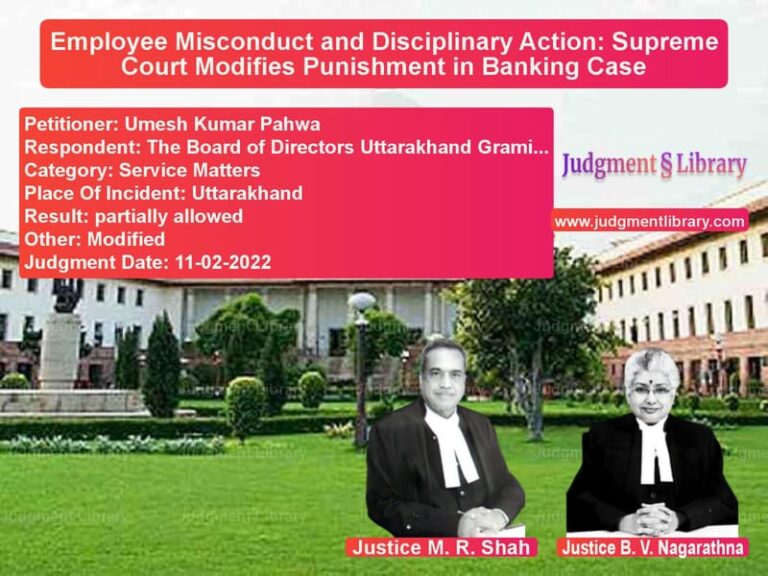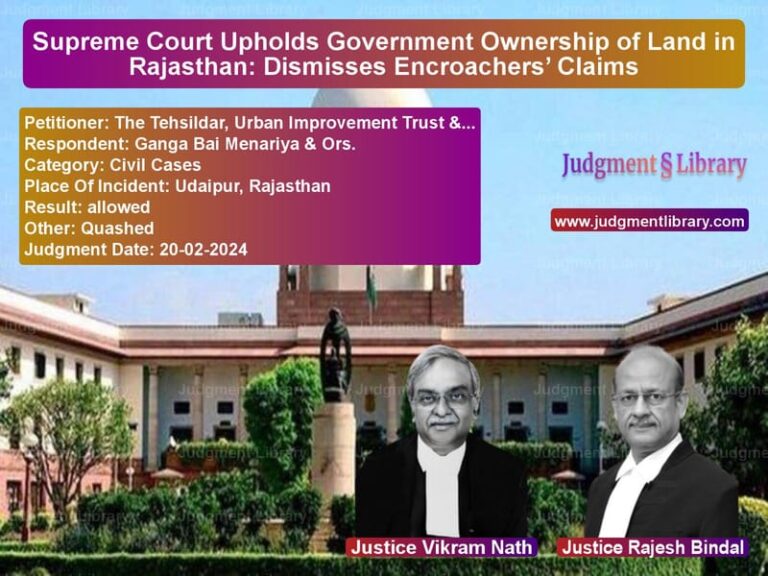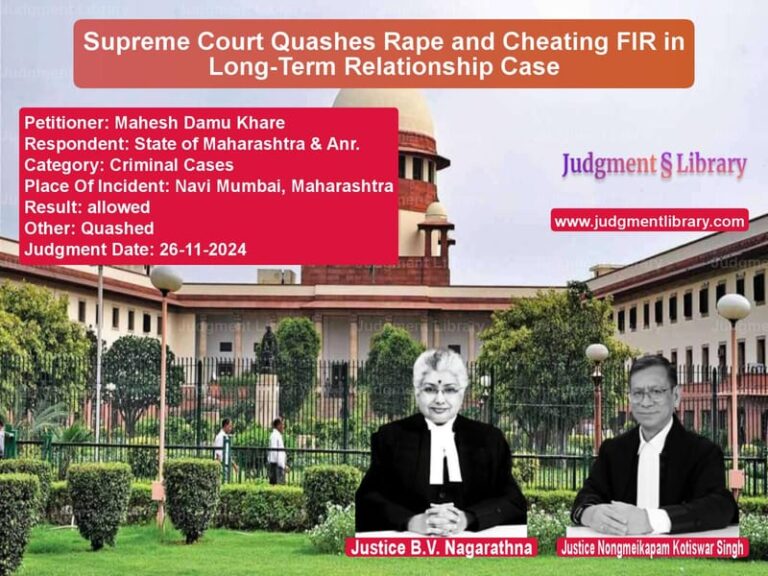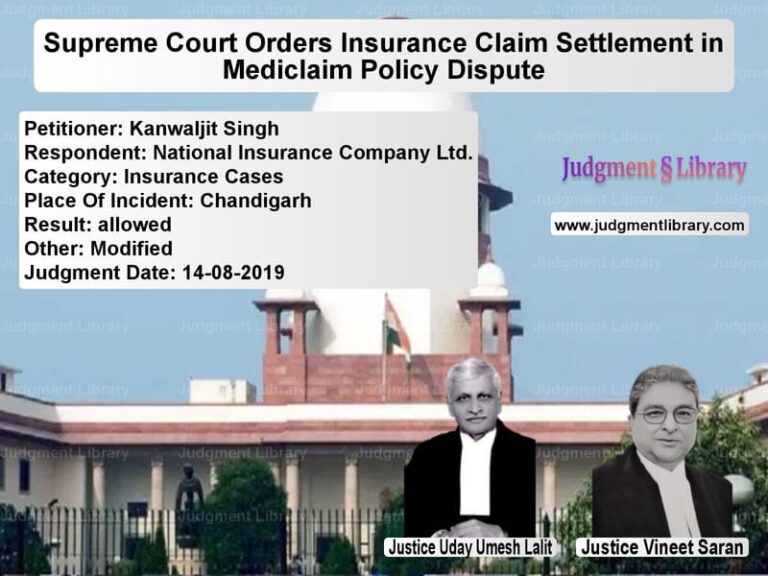Supreme Court Upholds Life Imprisonment for Double Murder in Kerala Mosque Dispute
The Supreme Court of India upheld the conviction of two accused, Palakom Abdul Rahiman and G. Moideenkutty, for the double murder of Assainar and Abdul Rahiman in a mosque dispute in Kerala. The Court reaffirmed their life imprisonment sentence under Section 302 read with Section 34 of the Indian Penal Code (IPC), rejecting their appeals against the High Court’s ruling.
Background of the Case
The case originated from an incident that occurred on December 5, 1995, in the premises of Bardar Masjid, Kumbadage village, Kerala. A dispute arose regarding the removal of the mosque’s former Katheeb (preacher). The disagreement led to violence, resulting in the fatal stabbing of Assainar and Abdul Rahiman, and serious injuries to Mohammed (PW-2), a witness to the crime.
The prosecution initially charged 11 individuals under various sections of the IPC, including 143, 148, 323, 324, 325, and 302 read with 149 IPC. The trial court convicted accused Nos. 1 (Palakom Abdul Rahiman) and 3 (G. Moideenkutty) along with others, sentencing them to rigorous life imprisonment. Upon appeal, the Kerala High Court found the two accused guilty under Section 302 read with Section 34 IPC and reaffirmed the life sentence.
Aggrieved by the High Court’s judgment, the two accused filed appeals before the Supreme Court.
Key Legal Issues Before the Supreme Court
- Whether the appellants’ conviction under Section 302 read with Section 34 IPC was justified.
- Whether common intention among the accused was proven beyond reasonable doubt.
- Whether the case should have been considered under a lesser charge, such as culpable homicide not amounting to murder.
Arguments Before the Supreme Court
Appellants’ (Palakom Abdul Rahiman & G. Moideenkutty) Contentions:
- The defense argued that the trial court initially convicted them under Section 302 read with Section 149 IPC (offense committed by unlawful assembly). Since the High Court ruled that no unlawful assembly existed, their conviction under Section 34 IPC (common intention) was incorrect.
- They claimed that the prosecution failed to establish a common intention between the accused to commit murder.
- The accused contended that even if the prosecution’s version was accepted, the case should fall under the exceptions to Section 300 IPC, reducing it to culpable homicide under Section 304 IPC.
- They further argued that the injury allegedly inflicted by one of the accused did not appear in the post-mortem report, indicating possible false implication.
Respondent’s (State of Kerala) Counterarguments:
- The State submitted that both accused were part of a planned attack, and their actions were in furtherance of a common intention to kill the deceased.
- They highlighted the presence of multiple stab wounds on the victims, proving the severity and intention behind the crime.
- The prosecution relied on eyewitness testimonies, medical evidence, and the fact that the accused were armed with sharp weapons at the time of the attack.
Supreme Court’s Observations
The Supreme Court carefully examined the evidence and made the following observations:
- “Both accused acted with a common intention to murder Assainar and Abdul Rahiman, as evidenced by their coordinated attack using daggers.”
- “The presence of common intention among the accused is established through their actions and the exhortation by one of them to ‘go and stab’.”
- “The argument that the case should fall under culpable homicide under Section 304 IPC is without merit, as the nature of the injuries clearly shows an intent to kill.”
- “The conviction under Section 302 read with Section 34 IPC is valid, as each accused played a direct role in the commission of the crime.”
The Court rejected the appellants’ argument that their actions did not indicate common intention. It reaffirmed that common intention can be inferred from the manner in which the crime was executed.
Final Judgment
The Supreme Court upheld the conviction and life imprisonment of both accused and dismissed their appeals. The key rulings were:
- The life sentence imposed on the accused was justified based on the gravity of the offense.
- Common intention under Section 34 IPC was adequately established.
- The appeals lacked merit, and the accused were directed to surrender immediately to serve their remaining sentence.
Conclusion
This judgment reaffirms the principle that common intention in murder cases can be inferred from circumstances and coordinated actions of the accused. It serves as an important precedent in criminal jurisprudence, ensuring that individuals involved in planned killings are held accountable even if their specific roles in the attack vary.
Petitioner Name: Palakom Abdul Rahiman & G. Moideenkutty.Respondent Name: The Station House Officer, Badiadka Police Station, Kerala.Judgment By: Justice A.M. Khanwilkar, Justice Ajay Rastogi.Place Of Incident: Kumbadage village, Kerala.Judgment Date: 09-04-2019.
Don’t miss out on the full details! Download the complete judgment in PDF format below and gain valuable insights instantly!
Download Judgment: Palakom Abdul Rahima vs The Station House Of Supreme Court of India Judgment Dated 09-04-2019.pdf
Direct Downlaod Judgment: Direct downlaod this Judgment
See all petitions in Murder Cases
See all petitions in Attempt to Murder Cases
See all petitions in Custodial Deaths and Police Misconduct
See all petitions in Judgment by A M Khanwilkar
See all petitions in Judgment by Ajay Rastogi
See all petitions in dismissed
See all petitions in supreme court of India judgments April 2019
See all petitions in 2019 judgments
See all posts in Criminal Cases Category
See all allowed petitions in Criminal Cases Category
See all Dismissed petitions in Criminal Cases Category
See all partially allowed petitions in Criminal Cases Category







